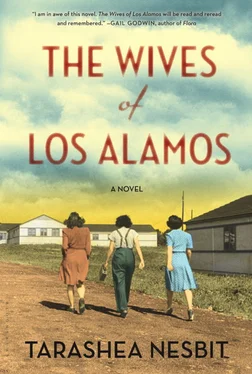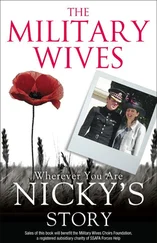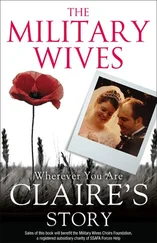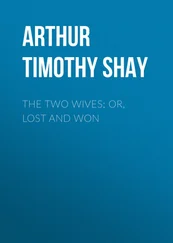ONE OLDER SCIENTIST spoke only in a whisper, and then only when spoken to directly, and never made eye contact. We called him Mr. Baker, and if we knew him from before Los Alamos, back at Chicago, say, or in New York, we called him Uncle Nick, because though it was strictly forbidden to say aloud that he was the infamous, talented physicist Neils Bohr, we just could not bring ourselves to call him Mr. Baker. We admired how he played a comb covered in tissue paper. Our husbands regarded him with deference and held their tongues the moment his lips parted.
WE TOOK TO reading war history books we checked out from the tiny library Helen ran. We asked ourselves, again and again, what were the options with the Army involved? We thought chemical weapons, maybe an expansion of mustard gas. We thought—we hoped—our husbands were working on code breaking, but our husbands were physicists and we had to consider what they might be able to build using their skills. We considered a weapon. We learned more than we wanted to about mustard gas—large blisters filled with yellow fluid, burning skin, blinding until death. Though we wanted the war to end, and we wanted to go home, and we generally were not skeptical, and we thought maybe it was a good war, we did not respond well to the individual stories of other people suffering from these weapons. We sometimes hoped our husbands would fail.
IN EARLY JUNE, the news came to us first through the military radio station, and when we heard it, we could not believe it. In over eight centuries, no one had ever successfully crossed the English Channel in battle. But now the military had. It seemed so unlikely, or it seemed just about time, and this was one of the few instances when we clinked our glasses with the military men and WACs, united in our shared victory.
WHILE WE BOILED oats for breakfast, twenty-five thousand men—our brothers, nephews, childhood crushes—were ascending the foggy beaches of Normandy. The German Field Marshal had taken the weekend off, concluding that the high seas would make it impossible for the Allies to land and the low clouds would prevent aircraft from finding their targets. Also, and we loved this fact, it was his wife’s birthday.
EVERY MONTH WE admired the full moon, how it lit our way back to our homes after dinner parties. Across the world others were appreciating the full moon for how it lit their ships’ paths in the early dawn. We came home in a good mood—the moon did this—thinking of how small we were, how large the world was.
NOW SWORD, JUNO, Gold, Omaha, and Utah beaches were stormed; bridges were bombed; Allies were moving forward on one front, but they seemed to be losing ground in the Pacific. Each night as we slept, other lives were ending.
AT THE MAIL counter, where we stood asking if our mail had arrived, depositing new letters addressed to our mothers, there was a poster. What caught our eye was the word wanted! We looked closer. We saw a dark-haired, pale-faced woman, her hair in a victory roll, like ours. She appeared menacing with the dark background and the direct eye contact, except her face seemed gentle, too. Was there a killer in our midst? She looked like one of us, but no one we exactly recognized. We studied the poster more closely and saw the writing above her head: wanted! for murder. And below her neck: her careless talk costs lives.
SOME OF US shivered, some of us got paranoid about what we told Judy the day before, some of us laughed on the inside but not the outside, for we had made the mistake of laughing at this kind of thing in front of WACs before. It did not ingratiate ourselves to them, and we needed them to obtain passes to Santa Fe and to find out how our children were doing in gym class. So we looked back, kept quiet, took our mail, said, Thank you , and walked home.
BECAUSE WHAT WE were doing was important, our commissary stocked chocolate bars. Mr. Gonzalez tended the vegetables with his watering can, but there was nothing he could do to perk up the wilted lettuce, peppers, and cucumbers shriveled in wood crates. Wrinkled zucchini, molding tomatoes, old garlic sprouting green tails. There were gallons of mustard and mayonnaise without a crisp vegetable in view. Milk in a small chest next to the vegetable bins, growing sour, and never enough for all of us. These Army-issued perishables traveled from El Paso and were not made fresher by the 360-mile journey.
WE ARGUED THAT there were perfectly fresh vegetables growing in the valley, so why could we not eat those instead? It was senseless, and we never got a straight answer, which was how things functioned in Sha-La. We bought cans of unmarked food and were surprised by their contents—beans, stewed tomatoes—and that occasionally—or frequently, depending on the storyteller—the cans had worms in them.
IT WAS ALSO at the commissary that we found new sources of information. We could tell, by their dress and stockings, who had just arrived to town. We offered to show them around the Hill and we offered to watch their children and we hoped they would lend us that pink dress we admired and share with us the tea they brought with them from London, and we hoped they would invite us over to their place to listen to new records. We traded our extra linoleum and our second pair of blue jeans for sugar, nylons, and secrets.
WE BUDGETED RATION coupons and saved up for steak on our anniversary, on our husbands’ birthdays, and on the night we announced we were pregnant. Not all of us were good about rationing, and not all of us thought the rules should apply to us. We became tricksters out of perceived need, or because we wanted a bit more excitement. When our ration books were empty we wore red lipstick to the commissary; we leaned in to the butcher counter and said to the GI behind it, You wouldn’t let me starve, would you, John? And John could rarely say no to us, women asking sweetly for meat, and we reached our arms out to receive steaks wrapped in brown paper, and we slipped him something expensive, but easier to come by: a paper bag of whiskey.
IN JUNE, ON picnics, on hikes, our children saw columns of ants in the sky. Ants fly? they asked. We thought of when we were younger, when we were more romantic, when we learned about the behavior of ants. We knew a lot about the mating rituals of ants because we had written a thesis on them, because our mothers had, because we remembered things Mister Smith told us in Bio 101.
WE TOLD OUR children this was their nuptial flight. We told them it was how ants make children. We did not say starlings hover nearby, watching, waiting until the ants are too tired to fight, or too dizzy from the day, and all the starlings have to do is open their mouths to receive this humming column of food in the sky.
FROM AFAR IT looked like falling rain and we did not tell our children how the male ants beat their wings excitedly, mount, and drop in hundreds from the sky. How the queen flies away, tears off her own wings, digs a hole, forms a nest, and waits for her children to hatch.
WE LET THEM make an anthill from a Mason jar and keep it in their room. They fed the ants breadcrumbs and within a few days the ants died. While our children were away at school we dug up new ants and replaced the old ones, so for at least a little while our children would not know there are things they cannot save.
SINCE THE DRAFT age had been extended in 1941 and our husbands were no longer working at the university, we worried they might have to leave us to fight in the war. But we were told there was no way our husbands would ever have to go to war since they were working on a war project. Sometimes the draft letter did come, and our husbands left for San Francisco, and we were certain they would be called to the Pacific theater, or we had a feeling it would all be okay.
Читать дальше












